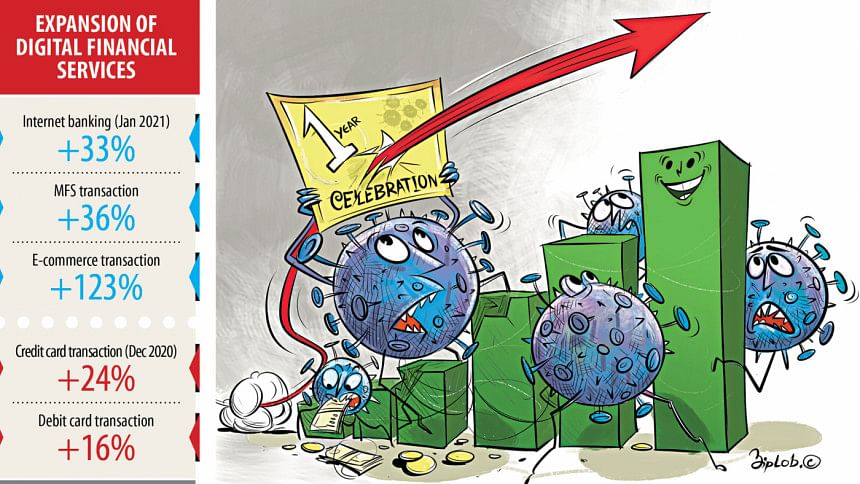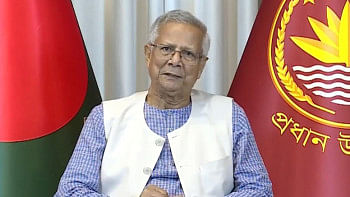Cashless transactions get a fillip

After receiving his monthly salary through a bank account, Siddique Ahmed Rubel, an employee of a nongovernmental organisation, used to withdraw a large portion of his earnings through ATM booths in order to meet expenses.
However, the ongoing coronavirus pandemic has brought drastic changes to his lifestyle as he now hardly carries cash.
"Although I had a debit card before the beginning of the pandemic, I did not know how to use mobile banking applications," Rubel said.
"I was compelled to learn the use of these applications after the government imposed a nationwide lockdown between March and May," he added.
Initially, Rubel used digital financial services (DFS) to avoid leaving home in fear of infection but he now enjoys the convenience provided by these facilities.
"Around 70 per cent of my monthly earnings are spent through DFS platforms, which are a highly secured and comfortable means to make transactions," he said.
Rubel is not a solitary case though as a large number of people have joined the DFS bandwagon.
As a result, cashless transactions have increased significantly in recent months and this has had a positive impact on the economy as a whole.
For instance, the country has to count more than Tk 9,000 crore in transactions each year due to its heavy dependence on cash, according to a Bangladesh Bank report prepared in 2019.
Shops and banks have to bear the most—33 per cent each—for using cash followed by corporate entities 13 per cent, the government 10 per cent and individuals 6 per cent, the report said.
The report styled "Reducing the cash transaction" mentioned that the maintenance cost of printed money is nearly 0.5 per cent of the country's gross domestic product.
The central bank made this calculation based on a survey by McKinsey & Company, a consultancy firm from the US.
Although Bangladesh Bank is yet to prepare a report on the cost of maintaining cash last year, this expense has surely decreased due to the expansion of DFS, according to an official of the banking regulator.
"The deepening recession caused by the pandemic has taken its toll on the global economy, including Bangladesh, but there is a ray of hope in the upward trend of DFS usage," said Md Arfan Ali, managing director of Bank Asia.
The use of all payment modes under DFS increased significantly throughout 2020 and the trend is still ongoing, he added.
Ecommerce transactions, a vital component of DFS, totalled Tk 598 crore in December last year, up 123 per cent year-on-year.
Transactions through mobile financial services (MFSs) also posted magnificent growth during the same period as underprivileged people are now embracing branchless banking windows in bigger numbers than ever.
MFS transaction grew 36 per cent year-on-year to Tk 57,253 crore in January, central bank data shows.
"The banking sector achieved unprecedented success in the arena of DFS amid the pandemic," Ali said. "It has gained the same achievements that the country's financial institutions managed in five years before the pandemic."
"Clients can now frequently use different online tools to settle their transactions and the trend will continue in the days to come," he added.
DFS will not only reduce the cost of keeping cash but also expedite the economy's growth, according to a report by the International Monetary Fund (IMF).
The study titled, "The promise of Fintech: financial inclusion in the post-Covid-19 era", gave the message that digital financial inclusion would help underprivileged borrowers smoothly manage funds.
Banks would be able to disburse loans through Fintech such as MFS providers, the IMF report said.
Some Bangladeshi lenders and one MFS provider have already taken initiatives to this end.
Mahiul Islam, head of retail banking at Brac Bank, said growth in the country's financial sector has advanced by at least five years amid the pandemic as dependency on digital means has increased significantly.
"The use of both credit and debit cards has been on an exceptional rise, meaning that we are moving towards a cashless society," Islam added.
The use of both credit and debit cards did indeed hit an all-time high in December last year, Bangladesh Bank data shows.
Total card loans held by lenders stood at Tk 1,561 crore in December, which is a fresh record in terms of the lending amount.
December's figures are up 8.84 per cent from that of a month earlier and 23.78 per cent year-on-year.
Clients also posted a new spending record through debit cards as the figure stood at Tk 18,795 crore, up 8.44 per cent from that of a month earlier and 16.51 per cent year-on-year.
Syed Mohammad Kamal, country manager of MasterCard Bangladesh, said the existing financial transactions made through DFS would witness a tremendous increase if the government paid cash incentives against digital payments.
The Bangladesh Association of Software and Information Services, a national trade body for the local software and IT-enabled service industry, recently proposed 5 per cent cash incentives for clients and merchants against payments for goods and services made through digital means.

 For all latest news, follow The Daily Star's Google News channel.
For all latest news, follow The Daily Star's Google News channel. 



Comments